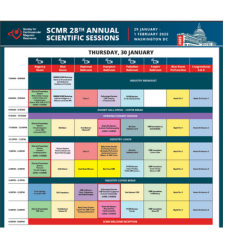Technologist Track
Establishment of a synthetic ECV model and its prognostic value in AMI patients with diabetes
- WC
Wensu Chen, MD
Cardiologist
Affiliated Hospital of Xuzhou Medical University, China (People's Republic) - WC
Wensu Chen, MD
Cardiologist
Affiliated Hospital of Xuzhou Medical University, China (People's Republic) - WC
Wensu Chen, MD
Cardiologist
Affiliated Hospital of Xuzhou Medical University, China (People's Republic)
Presenting Author(s)
Primary Author(s)
Co-Author(s)
Synthetic extracellular volume (ECV) without blood sampling has been established and validated in some study cohorts. However, the synthetic ECV and its prognostic value in acute myocardial infarction (AMI) patients with diabetes is unclear. This study investigated the establishment and validation of synthetic ECV and its prognostic value in AMI patients with type 2 diabetes mellitus (T2DM).
Methods:
This single-center retrospective study included patients diagnosed with AMI who completed cardiac magnetic resonance (CMR) during hospitalization. The patients were randomly divided into a derivation group and a validation group. MACE included all-cause death, recurrent MI, stroke, or heart failure. ECV in integral (Integral ECV), non-myocardial infarction region (NMI-ECV), and myocardial infarction region (MI-ECV) was obtained by CMR.
Results:
The study included 157 patients, with a median time from admission to CMR of 4 days. Over a median follow-up of 26.6 months, 41 (26.1%) patients experienced MACE. Bland-Altman and Pearson analysis showed good consistency and correlation between conventional ECV and synthetic ECV. Cox regression showed that Integral ECV (HR=1.07; 95%CI: 1.01 ~ 1.13, p</span> = 0.023), MI-ECV (HR=1.03; 95%CI: 1.00 ~ 1.07, p</span> = 0.024), and NMI-ECV (HR=1.07; 95%CI: 1.00 ~ 1.14, p</span> = 0.039) were independently associated with MACE in different models. Kaplan-Meier analysis indicated that patients with a high synthetic ECV had a significantly higher MACE risk. Synthetic ECV is strongly consistent and correlated with conventional ECV in AMI patients with T2DM. Elevated synthetic ECV is an independent risk factor for MACE in AMI patients with T2DM.
Conclusion:

